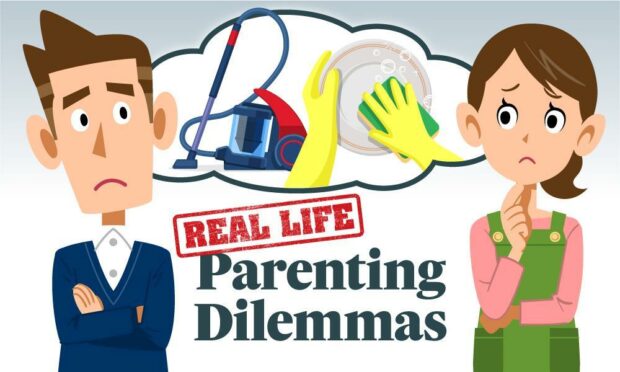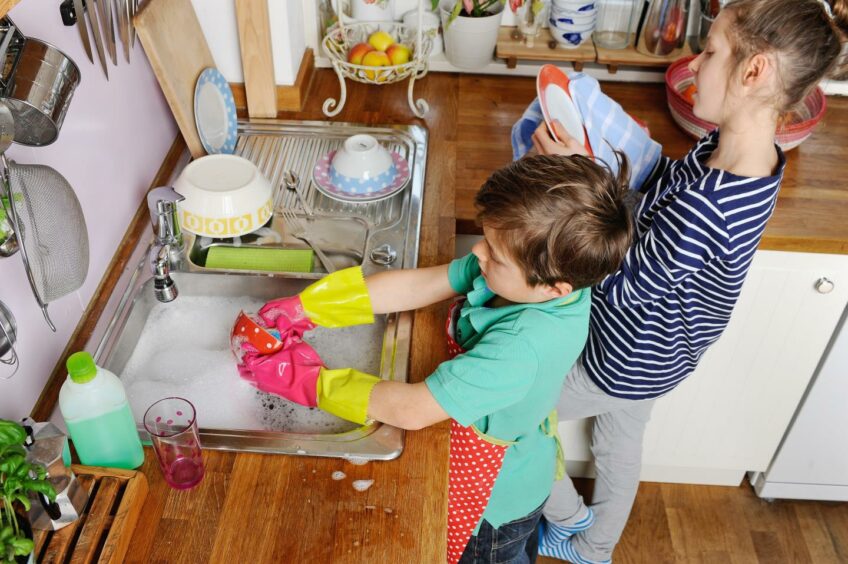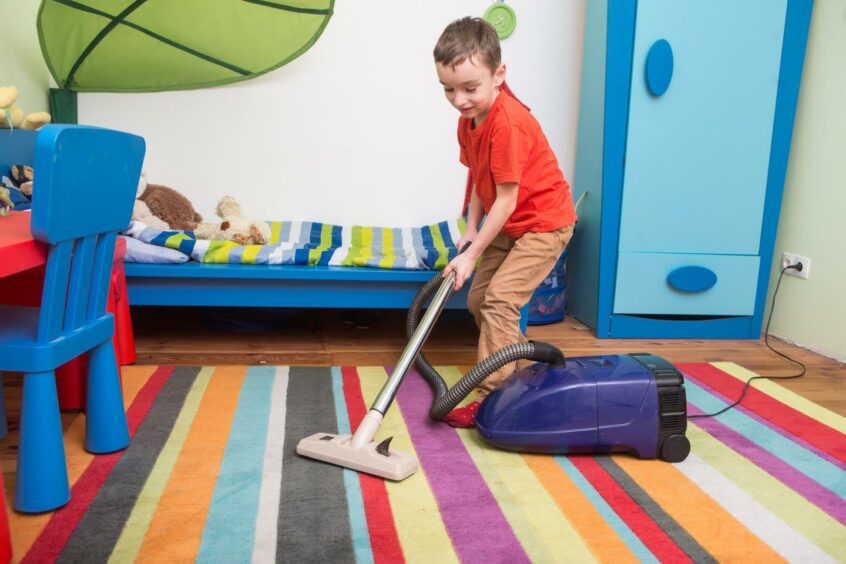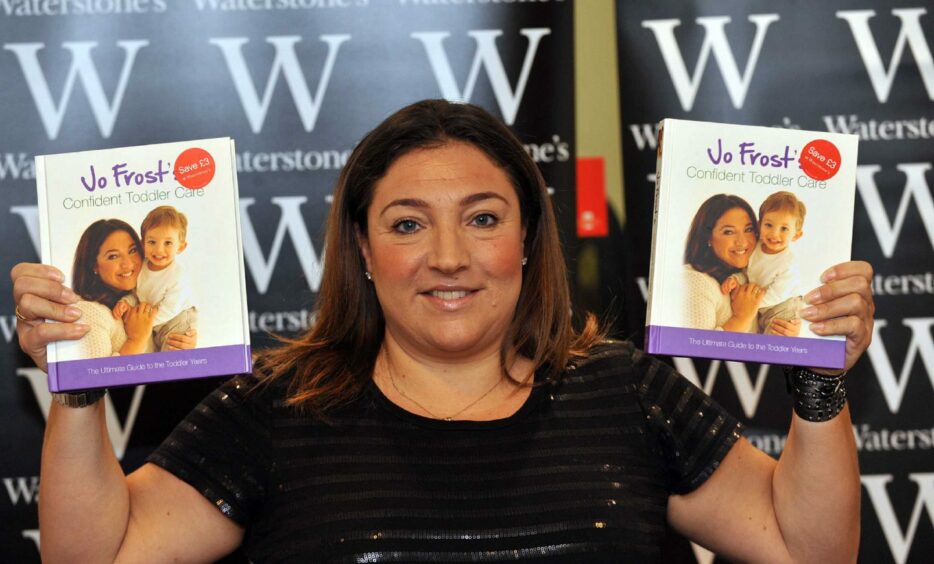Children should begin helping with household chores at the age of two.
This is such a surprising answer, we’ve given the game away immediately – but stick with me while I explain.
As the father of kids aged 11, eight and 18 months, I’ve been trying to teach my oldest the need to pull his weight at home.
According to experts, however, I’m way behind and should already be thinking about introducing my toddler to simple tasks.
What household chores should my child do, and at what age? It’s one of the most common parenting dilemmas, and one that provokes a wide array of opinions.
When do YOU think chores for kids is appropriate?
Introducing children to household chores covers a number of bases. Appreciating what their parents do for them every day, and lending a hand. Learning to become responsible for themselves. And when it comes to pocket money as a reward for carrying out tasks at home, an understanding of the value of money.
Parents spend on average 1,455 minutes (24 hours) a week doing chores, according to research commissioned by cleaning company End of Tenancy Cleaning.
If parents were paid for cleaning they could earn an average of £218.50 per week – that’s £10,488 a year.
The results of a survey of 3,446 parents revealed that parents spend the most amount of time cooking, at 263 minutes per week (around 38 minutes a day).
This is followed by the weekly food shop (112 minutes) and washing up (110 minutes).
Lower down the list are chores like changing sheets/towels and wiping down surfaces/appliances, at 57 and 54 minutes, respectively.
Busy parents typically get just under one hour per week, uninterrupted, to do any home decorating.
Tired parents – should kids step up?
Family counsellor and parent training mentor Judah Racham feels parents need a break.
“It’s not easy being a parent in the 21st century, and the demands placed upon us are always increasing,” he said.
“Society’s expectations for parents have changed significantly from when our parents were raising us.
“Today, the idea of a ‘good’ parent is often a parent who not only works long hours each day, but also finds time each evening to play with their child. Without forgetting that you may also need to cook dinner, complete household chores, and help children with their homework.
“For me, this all sounds unrealistic.”
So it’s perhaps only fair that children learn to do their fair share at home. But at what age?
Common chores for kids should be encouraged from age two
Shaddai Tembo is a lecturer in early education and childhood practice at the University of the Highlands and Islands (UHI).
He said: “Children should be encouraged to support with activities around the house from a young age, as the research shows that it can be a meaningful way to encourage personal and social responsibility.
“It’s difficult to specify an exact age at which children should be helping with chores, as they develop at different rates.
“However, simple tasks when a child is two years old, such as encouraging them to pick up their toys when finished or scrape their dinner plate, can then give way to helping with laundry, loading the dishwasher, cleaning their room, or light mealtime preparation as they get older.”
Kids appreciate money more when they’ve earned it, research shows
Teaching children the value of money is an important lesson for all parents. One of our greatest fears is that our child becomes spoilt.
According to Barclays Bank, almost three quarters (74%) of parents think their children appreciate money more when they earn it through household chores.
Last year, children received an average of £1.22 for setting and clearing the table, £1.26 for emptying the dishwasher, £1.36 for folding the laundry, and £1.57 for tidying their room.
Pocket money now stands at an average of £6.48 per week.
So should children get paid for doing chores?
While pocket money for a job well done has its merits, Mr Tembo advises caution.
“Offering a reward for chores can be useful in some circumstances,” he said.
“However, once the reward stops, the behaviour usually stops with it.
“If positive attitudes toward helping with domestic activities are encouraged from a young age, the child itself should feel motivated to help out, without the need for financial reward.
“It’s all about social responsibility and encouraging the child to develop a sense of care for themselves and others.
“Being able to contribute toward household activities often leads to more pro-social behaviours in other aspects of life.”
A recent survey showed that most parents think the pandemic has had a negative impact on their child’s behaviour.
To pay or not to pay, that is the (‘thorny’) question
Dr Ruth Woods is a psychology lecturer at Robert Gordon University (RGU) in Aberdeen, specializing in children.
She described the question of whether or not children should be paid for doing chores as a “thorny issue.”
She said: “On the one hand, there is evidence that giving financial rewards to children for carrying out helpful tasks makes them less likely to do them when there’s no reward.
“On the other hand, rewards do make it easier to engage children in activities which, let’s face it, can be boring.
“Also, for some parents, paying children is beneficial because it teaches them the concept of earning money and saving.
“If children have to save up these payments over several weeks in order to buy what they want, then they are developing their ability to delay gratification. This is a very useful self-regulatory ability which has lots of positive effects as children grow up.
“I think that different solutions are going to work for different families.”
Don’t want your child to become spoilt? Responsibility and independence are key
Have today’s children become spoiled? Have they forgotten the value of saving, and delayed gratification?
“The notion that children have become spoiled can mean a lot of different things, and is essentially impossible to prove,” said Mr Tembo.
“In the media, it tends to come with a demonization of parents who give their children what is seen as ‘too much’ attention.
“This then leads to calls for more traditional disciplinarian approaches, that emphasise obedience and create unequal power relations between adult and child.
“If we want to encourage better decision making in children, we should be supporting them to develop their own sense of responsibility and independence.”
Mr Tembo’s assertion that kids are ready to help out with small tasks from the age of two surprised me.
However, several other child experts are in agreement.
One of them is ‘Supernanny’ Jo Frost of TV fame.
She says toddlers and pre-schoolers can help with making beds, picking up toys, dusting, carrying laundry, and fetching the post.
It seems I have work to do with my kids – and not just the oldest.
More from the Schools and Family team
Talking to kids about Ukraine: How to handle a worrying topic
Calum Petrie: We Dads do our bit, and don’t need a ‘pat on the back’





